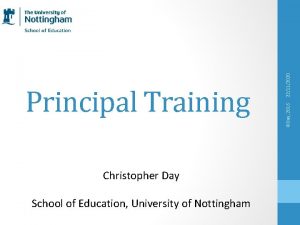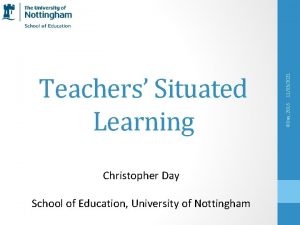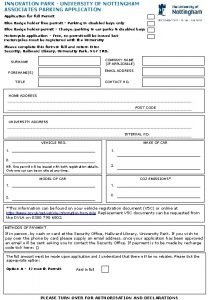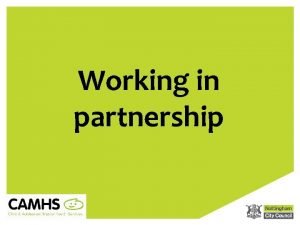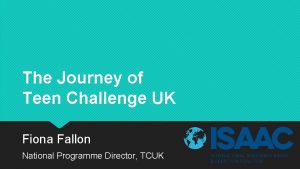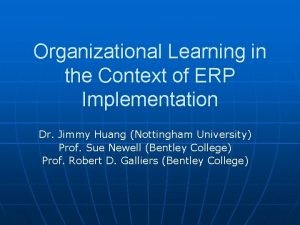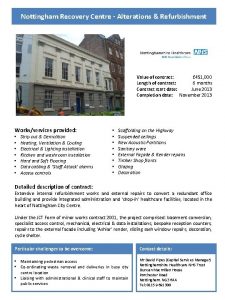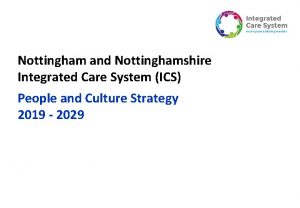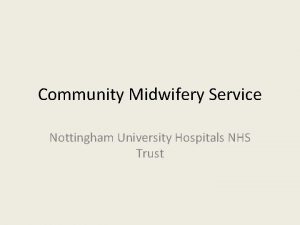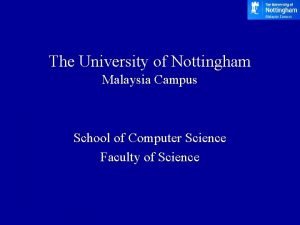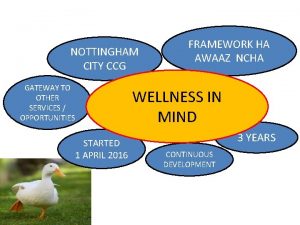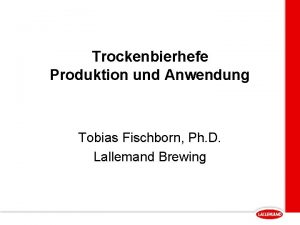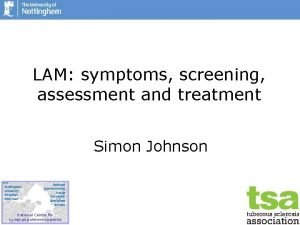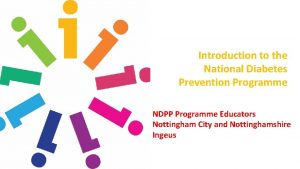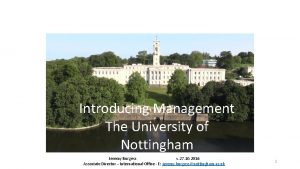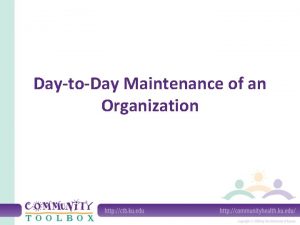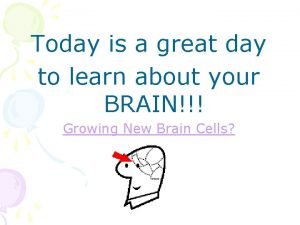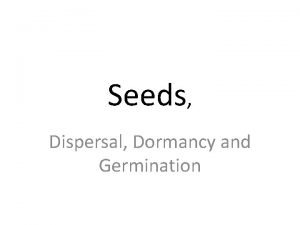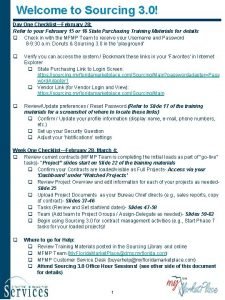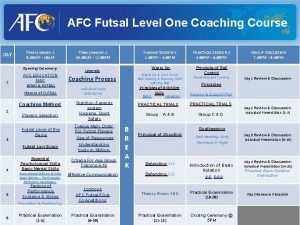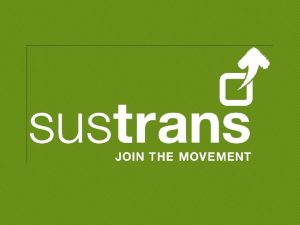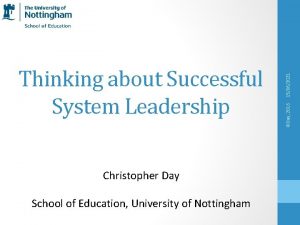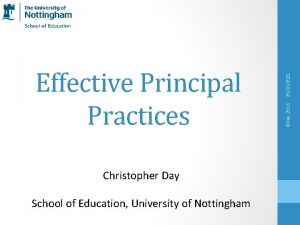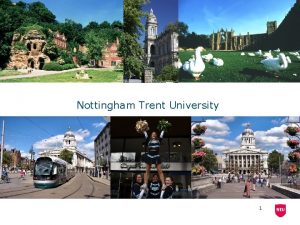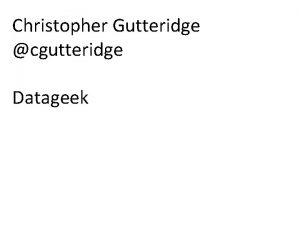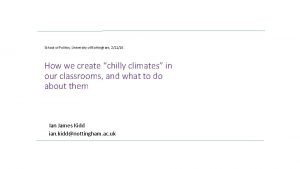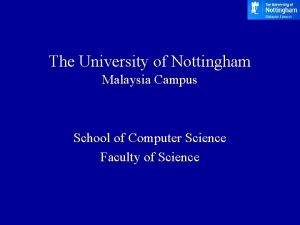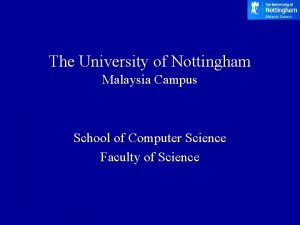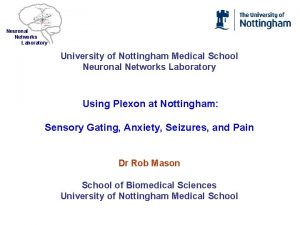Christopher Day School of Education University of Nottingham














































![(The Wallace Foundation, 2011: 13) ©Day, 2016 [System leaders]……… need to be aware that (The Wallace Foundation, 2011: 13) ©Day, 2016 [System leaders]……… need to be aware that](https://slidetodoc.com/presentation_image_h/85f5fc98f4c096b22819802fe4863a6e/image-47.jpg)






- Slides: 53

Christopher Day School of Education, University of Nottingham 22/11/2020 ©Day, 2016 Principal Training

(OECD, 2012: 26) ©Day, 2016 22/11/2020

©Day, 2016 People are at the heart of any organisation, particularly a school, and it is only through changing people – nurturing and challenging them, helping them grow and develop, creating a culture in which they all learn – that an organisation can flourish. (Hoerr, 2005: 7) Good leaders change organisations; great leaders change people. 22/11/2020 Leadership

• The new educational agenda Demands a new type of school leader who can cope proactively with dynamic, complex and sometimes uncertain contexts. (Chong et al; 2003, p. 168) ©Day, 2016 • The old agenda Previously the compliant and efficient manager was valued in a system that was almost completely controlled from the centre. 22/11/2020 Rationale

(Kouzes and Posner, 2007: 24) ©Day, 2016 In talking to leaders and reading their cases, there was a very clear message that wove itself throughout every situation and action. The message was: leadership is relationship…. between those who aspire to lead and those who choose to follow. It’s the quality of this relationship that matters most when we’re engaged in getting extraordinary things done. 22/11/2020 Leadership as Relationship

©Day, 2016 i. Knowledge of context ii. Knowledge of people iii. Knowledge of culture iv. Knowledge of pedagogy v. Knowledge of change 22/11/2020 1. Effective District and School Leadership: Five Essential Knowledge Domains

©Day, 2016 • Policy trends • Social trends • International research about successful systems/schools/teaching and learning • Educational vision, beliefs, values • Variations in teachers’ work and lives 22/11/2020 i) Knowledge of Context

Building effective teams Participating in professional development Building trust Progressive distribution of leadership Performance management (appraisal) Building capacity and capability The external community Teaching as emotional work Self: diagnosis, discernment and decision making processes ©Day, 2016 • • • 22/11/2020 ii) Knowledge of People

• Creating a whole school policy for staff development which meets organizational, policy and individual needs 22/11/2020 • Sharing the leadership, empowering others ©Day, 2016 iii) Knowledge of Culture • Inclusive management and leadership • Finger always on the pulse and the life of the school and its community

iv) Knowledge of Pedagogy • Formative and summative assessment purposes and practices • Data collection, analysis and use ©Day, 2016 • How students learn best 22/11/2020 • A range of effective teaching approaches

v) Knowledge of Change • Emotions and change • Effective planning strategies for organizational and pedagogical change • Action planning and implementation • How change may be sustained and embedded • How to build a learning community ©Day, 2016 22/11/2020 • How individuals change

The Myth of a Single Model 22/11/2020 ©Day, 2016 What We Know About What is Most Likely to Lead to Success:

©Day, 2016 22/11/2020 ©Day, 2016 There are many models of school leadership but those most closely associated with success are transformational and instructional (integrated) in which decisions about improvement are contingent within a strong, collective framework of values.

©Day, 2016 22/11/2020 Transformational Leadership

• Working collaboratively at both strategic and operational levels with parents and for the well-being of all children. School improvement and community development are interdependent. ©Day, 2016 • Collaborating with other schools in order to share expertise and bring positive benefits to their own and other schools. 22/11/2020 Leading in the Community

Innovation leaders 22/11/2020 Collaborative leaders ©Day, 2016 Compliant leaders Innovation Controlled leaders maintenance What Types of Leaders do We Want?

©Day, 2016 • Focus on accountability and government requirements • Wary of change • Technical approach and risk averse • Good at developing systems • Use tried and tested approaches in their schools • Has authority – ‘the boss’ 22/11/2020 Controlled leaders

©Day, 2016 • Enact and interpret the government policy agenda in an unproblematised way • Find change confronting • Existing practices are modified to comply with government agenda • Asks how and when 22/11/2020 Compliant leaders

©Day, 2016 • Transformative practices – change agents • Visionaries – often far ahead of the teachers in their schools • Charismatic – visible inside and outside of the school • Thinks outside the box to solve problems 22/11/2020 Innovation leaders

©Day, 2016 • Focus on people and builds teams • Creates an environment where asking ‘why’ is important • Works with colleagues and build consensus and trust • Models the type of behaviour that is expected in the school 22/11/2020 Collaborative leaders

• • a powerful, guiding vision for the scheme; effective recruiting strategies; rigorous selection procedures; a training programme which focuses on teaching and learning and school improvement; the instructional design based on adult learning theory and use of problem-based learning and case studies, etc. ; an intensive and highly focused induction experience at the beginning; a cohort structure which is used to encourage collaboration and mutual support; lengthy school-based internships (ideally of one year) doing meaningful leadership work; regular support from expert coaches and mentors; and programme champions who promote its values and drive the scheme. (Darling Hammond et al; 2007, 2009) ©Day, 2016 • • • 22/11/2020 Exemplary Programmes

Leadership Development The National College offers leadership development activities for school leaders at all stages of their career At the moment this is broadly grouped as follows: England- 500, 000 teachers • Middle and senior leaders • Aspiring headteachers • New headteachers Experienced headteachers • System leaders ------------------- • School business managers • Strategic leadership of ICT 200, 000 middle leaders 25, 000 heads

Leadership Programmes • Programmes based on leadership standards − Shaping the future – creating a vision − Leading learning & teaching − Developing self and working with others − Managing the organisation − Securing accountability − Strengthening community • England- 500, 000 teachers A blended delivery model − Face-to-face learning − Individual self study and online learning − Collaborative reflection − Real application or enquiry based work in school − Masters level accreditation

• • Duration: 6 -18 months Process: Minimum 9 days in a school with a different context Complete 3 basic study modules and 2 electives Go through a final ‘accreditation’ evaluation i. e. 3 tasks (one in own school, a second in a different school, presentation and interview demonstrating what was achieved Contents: Leading and enhancing teaching Leading an effective school Success in school management ©Day, 2016 • • • 22/11/2020 An Example of Best Practice: National College Programme

22/11/2020 ©Day, 2016 (Hitt et al. , 2012: 1)

©Day, 2016 22/11/2020 Recommendations for Pre-service Educational Leadership (Hitt et al. , 2012: 2)

Pre-Service Principal Training in Five High Performing Systems 22/11/2020 • The practitioner turn ©Day, 2016 • Tripartite collaboration • Provider expertise • Formal credentials • Selection (Walker et al; 2013)

©Day, 2016 22/11/2020 Recommendations for In-service Educational Leadership (Hitt et al. , 2012: 2)

• Practice based (sensitive to context) • Inquiry focussed • International perspectives • Research informed • Build capacity and capability at all levels of the system Lead to change ©Day, 2016 22/11/2020 The Most Effective Leadership Programmes

Successful Internships • require the intern to assume responsibility for authentic opportunities or tasks; 22/11/2020 • require the intern to develop knowledge and skills that are applicable across diverse settings; ©Day, 2016 • include practice-based experiences that are aligned to cover the Interstate School Leaders Licensure Consortium standards or the standards being used in the intern’s program of study; • connect theory and practice in a realistic and efficient way; • are feasible and sustainable within all parties’ work schedules; • provide openness and access to whatever is needed to complete activities; • ensure that activities prepare interns to assume administrative roles with competence and confidence (Hart and Pounder 1999; Browne-Ferrigno and Muth 2001; Williamson and Hudson 2001; Smith 2003; Cunningham 2007). (Cunningham and Sherman, 2008 ) ))

Evaluation (1) • Participant Perceptions • Participant Learning • Participant Performance • Impact on Practice (Kirkpatrick , 1994)

Evaluation (2) A six stage framework: • preparation experiences • participant satisfaction • changes in participants’ • knowledge, skills and dispositions • changes in practices in schools • changes in classroom conditions and improved student outcomes. (Leithwood and Levin, 2004)

(Grossman, Wineburg and Woolworth, 2001, cited from Lieberman and Miller, 2008: 14) 22/11/2020 ©Day, 2016 Evaluating the Growth of A Teacher Professional Community

• Identification with subgroups • Sense of individualism overrides responsibility to group norms • Undercurrent incivility Evolving • pseudocommunity • Recognition of unique contributions of individual members • Open discussion of interactional norms • Recognition of need to regulate group behaviour Mature • Identification with whole group • Recognition that group is enriched by multiple perspectives • Developing new interactional norms • Communal responsibility for and regulation of behaviour ©Day, 2016 Beginning 22/11/2020 Formation of Group Identity and Norms of Interaction

Beginning • Denial of difference • Conflict goes backstage • Appropriation of difference by dominant position • Conflict erupts onto main stage and feared • Understanding and productive use of difference • Conflict is expected feature of group life and dealt with openly and honestly ©Day, 2016 Evolving Mature 22/11/2020 Navigating Fault Lines

• Lack of agreement over purposes of professional community Evolving • Begrudging willingness to let different people pursue different activities Mature • Recognition that teacher learning and student learning are fundamentally intertwined ©Day, 2016 Beginning 22/11/2020 Negotiating the Essential Tension

Evolving Mature • Belief that teachers’ responsibility to students’ intellectual growth is an individual responsibility • Contributions to group are acts of individual volition • Recognition that colleagues can be resources for one’s learning • Recognition that participation is expected • Commitment to colleagues’ growth • Acceptance of rights of individuals and group obligations ©Day, 2016 Beginning 22/11/2020 Communal Responsibility for Individual Growth

How is social capital built Leader influence action Description Managing actions are taken to maintain consistency in order that current organisational goals are accomplished efficiently and effectively. Transforming actions are taken to influence direction, actions and opinions in order to change organisational conditions and culture so that learning and change occur as a normal routine of the organisation. Bonding actions are taken to ensure that trust is an attribute of the system and not just something developed among individuals in order that followers exhibit emotional commitment to the organisation’s aspirations and values. Bridging actions are taken to develop alliances with people of power and influence from outside and inside the organisation in order to gain insights, support and resources. Bartering actions are taken to give something in exchange in order to strengthen the effectiveness of relationships and alliance-building efforts. 22/11/2020 Managing ((Pisapia and Pang, 2012)

22/11/2020 ©Day, 2016 Twelve Key Challenges that Successful Leadership Programmes Address

Leader • Visionary • Inspires • Focuses on people • Has influence • Asks why? • Shows how its done • Says “we” • Does the right thing ©Day, 2016 Manager • Technical • Plans • Focuses on systems • Has authority • Asks how and when • Knows how its done • Says ”I” • Does things right 22/11/2020 Challenge 1. Manager or leader?

©Day, 2016 (Spillane and Louis, 2002) ©Day, 2016 Without an understanding of the knowledge necessary for teachers to teach well-content knowledge, general pedagogical knowledge, content-specific pedagogical knowledge, curricular knowledge and knowledge of learners-school leaders will be unable to perform essential school improvement functions such as monitoring instruction and supporting teacher development. 22/11/2020 Challenge 2 : Leading teaching and learning

(Fredrickson, 2004, p. 1375) ©Day, 2016 When positive emotions are in short supply, people get stuck. They lose their degrees of behavioral freedom and become painfully predictable. But when positive emotions are in ample supply, people take off. They become generative, creative, resilient…’. 22/11/2020 Challenge 3: Leading with Positive Emotions

(Day and Bakioglu, 1996) ©Day, 2016 • Initiation • Idealism, uncertainty, adjustment • Development • Self confidence, change, team building, trust • Autonomy • Single loop learning, continuing self confidence, distributed leadership, trust • Disenchantment/Celebration • Resistance to change, erosion of energy, optimism, renewed commitment 22/11/2020 Challenge 4: Principals’ Development and Capability Phases

©Day, 2016 22/11/2020 Challenge 5: Relative Impact of Five Leadership Dimensions on Student Outcomes (Robinson et al. , 2009)

©Day, 2016 • Leaders must learn how to create an organizational climate where others apply innovative thinking to solve problems. It is about growing a culture of innovation, not just hiring a few creative outliers. • How can you help others to think differently and work in new ways to face challenges? What can be done to innovate when all resources are stressed and constrained? How can you stay alive and stay ahead of the game? (Horth & Buchner, 2014) 22/11/2020 Challenge 6: Leadership for Innovation.

©Day, 2016 Absence of resilience at the most senior levels of leadership in schools can present itself as a deterioration in the general functioning of the school and can be evidenced in a variety of areas. These include loss of direction in terms of funding and budgeting; curriculum developments; teaching and learning strategies; control of discipline; staffpupil relationships and school-community relationships. (Birkbeck, 2011: 14) 22/11/2020 Challenge 7: Leadership Resilience
![The Wallace Foundation 2011 13 Day 2016 System leaders need to be aware that (The Wallace Foundation, 2011: 13) ©Day, 2016 [System leaders]……… need to be aware that](https://slidetodoc.com/presentation_image_h/85f5fc98f4c096b22819802fe4863a6e/image-47.jpg)
(The Wallace Foundation, 2011: 13) ©Day, 2016 [System leaders]……… need to be aware that school improvement does not happen overnight. A rule of thumb is that a principal should be in place about five to seven years in order to have a beneficial impact on a school. 22/11/2020 Challenge 8: Quality Retention

©Day, 2016 22/11/2020 They: “are able to learn and adapt to changes in their circumstances and their internal and external environments. They are able to modify their behaviours and to reconfigure their internal systems” (Mc. Millan, 2008 : 60) ©Day, 2016 Challenge 9: Prepare Leaders to manage schools as complex adaptive systems

(Elmore, 2004: 11) ©Day, 2016 Cultures do not change by mandate; they change by the specific displacement of norms, structures and processes by others; the process of cultural change depends fundamentally on modelling the new values and behaviour that you expect to displace to existing ones. 22/11/2020 Challenge 10: Leading and Managing Cultures

• • NLEs are outstanding head teachers, who along with their schools (National Support Schools), have capacity to support underperforming schools. • Both supported and supporting schools experiencing greater than average rates of improvement • Independent evaluation identified how NLEs can succeed in supporting other schools by: • Taking decisive action on behaviour, curriculum and quality of teaching • Focussing relentlessly on teaching and learning • Prioritising staff development and training • Achieving consistency, clarity of expectations, and carefully monitoring areas of concern and progress 22/11/2020 11. Making the Best Use of the Best Leaders National Leaders of Education 3. 5% 1. 8% 1. 3%

©Day, 2016 • Requires NLEs to reflect on their own practice, and observe both good and bad practice in their schools; • Supports succession planning activities, and enables staff to ‘step up’ and ‘step out’ of their school, in structured and supported manner; • Develops, supports, and enables individuals to practice coaching, facilitation and mentoring skills; • Enables staff to work in greater numbers of schools, in differing contexts, and with different structures, thus enabling them to broaden their experience; • Gives individuals the opportunity to celebrate their success and their achievements 22/11/2020 12. School to School Support

• “Workshops, institutes, classes, field experiences and mentor programmes are all likely to be ineffective strategies unless the activities are designed and carried out with the desire to make sure that principals will be successful” (Daresh, 2001: 173) ©Day, 2016 • Role clarification • Limitations on technical expertise • Socialisation to the profession at large and individual systems • Feelings of anxiety, isolation, ’felt’ ineffectiveness 22/11/2020 Limitations

22/11/2020 ©Day, 2016 Thank You! christopher. day@nottingham. ac. uk
 Christopher day nottingham
Christopher day nottingham Christopher day nottingham
Christopher day nottingham Day 1 day 2 day 3 day 4
Day 1 day 2 day 3 day 4 Direct and indirect speech worksheets with answers pdf
Direct and indirect speech worksheets with answers pdf University of nottingham parking permit
University of nottingham parking permit Do coyle
Do coyle Day 1 day 2 day 817
Day 1 day 2 day 817 Nottingham city school admissions
Nottingham city school admissions St christopher primary school coventry
St christopher primary school coventry St christopher primary school
St christopher primary school Bemh nottingham
Bemh nottingham Fallon sherrock smoking
Fallon sherrock smoking Pebblepad nottingham
Pebblepad nottingham Jimmy huang nottingham
Jimmy huang nottingham Nottingham city lado
Nottingham city lado Works perks nottingham city council
Works perks nottingham city council Beht nottingham
Beht nottingham Learning pit james nottingham
Learning pit james nottingham Npras nottingham
Npras nottingham Nottingham recovery centre
Nottingham recovery centre Nottingham and nottinghamshire ics
Nottingham and nottinghamshire ics Stacy johnson nottingham
Stacy johnson nottingham Dr nina lewis nottingham
Dr nina lewis nottingham Woodview children's home nottingham
Woodview children's home nottingham Community midwife nottingham
Community midwife nottingham Vanguard plus
Vanguard plus Nottingham progression flow chart
Nottingham progression flow chart Nottingham big wheel
Nottingham big wheel Pancreatic calcification
Pancreatic calcification Nottingham city ccg
Nottingham city ccg Nottingham ale hefe temperatur
Nottingham ale hefe temperatur Public mental health
Public mental health Manor surgery beeston
Manor surgery beeston Nottingham city hospital respiratory assessment unit
Nottingham city hospital respiratory assessment unit Nottingham north and east ccg
Nottingham north and east ccg Lam centre nottingham
Lam centre nottingham Ndpp
Ndpp Simon burgess nottingham
Simon burgess nottingham Nottingham redevelopment
Nottingham redevelopment Schoolmax login
Schoolmax login Ocean the part day after day
Ocean the part day after day Day to day maintenance
Day to day maintenance As your room gets messier day by day, entropy is
As your room gets messier day by day, entropy is Tomorrow i dont know
Tomorrow i dont know Act 2 timeline romeo and juliet
Act 2 timeline romeo and juliet Growing day by day
Growing day by day Seed germination inhibitors examples
Seed germination inhibitors examples Day by day seed germination observation chart
Day by day seed germination observation chart Seeds vs spores
Seeds vs spores I live for jesus day after day
I live for jesus day after day One day he's coming oh glorious day
One day he's coming oh glorious day Day one day one noodle ss2
Day one day one noodle ss2 Dayone dayone noodles ss2 小時光 肆號麵鋪
Dayone dayone noodles ss2 小時光 肆號麵鋪 沈榮麟
沈榮麟
